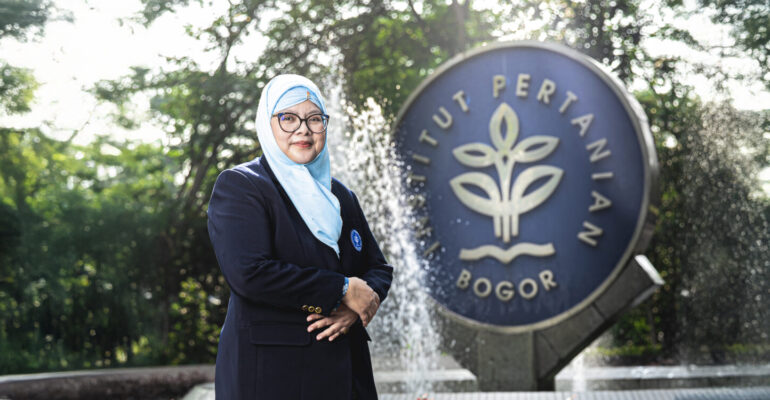Sijaka: IPB University’s Bioherbal Innovation for Indonesia’s Pharmaceutical Independence

Bioherbal medicine plays an important role in the pharmaceutical industry in Indonesia. As a megabiodiversity country, Indonesia has great potential in the development of bioherbal products, serving as a source of raw materials for herbal medicines that support pharmaceutical independence and reduce reliance on imports.
Prof Mega Safithri, a lecturer at IPB University and Chairper of the Department of Biochemistry, is one of the researchers focusing on bioherbal studies. One of her outstanding research innovations is Sijaka.
Sijaka (Red Betel Leaf, Red Ginger, Cinnamon) is an anti-diabetes and antioxidant supplement made from indigenous Indonesian herbal ingredients. She has been researching this formulation since 2005, starting from her postgraduate studies until now.
The Sijaka product has been tested at the Saraswanti Indo Genetech Laboratory (SIG), an internationally ISO-accredited facility. It is licensed and has already been produced by PT Nano Herbaltama Indonesia.
“This is proof that IPB University excels in bioherbal research, especially for anti-diabetes,” she stated in an interview on (7/2).
Additionally, she continued, another product ready for large-scale production is an anti-aging serum made from a nano extract of red betel leaf and nano propolis derived from Apis Mellifera bees. This product is set to be commercialized through the Promoting Research and Innovation through Modern and Efficient Science and Technology Parks Project (PRIMEStep).
According to her, the role of bioherbal medicine in the national healthcare system is very promising. Several diseases can develop due to redox reactions and imbalances between oxidative stress and antioxidants in the body. Synthetic chemical drugs generally treat diseases without restoring the overall homeostasis of the body’s oxidative stress and antioxidant systems.
“Meanwhile, bioherbal medicine has the potential to help improve bodily functions by maintaining the balance of the redox system in the body. One example is Sijaka, which, although it does not work as quickly as chemical-based drugs, can support the body’s overall recovery, making a person healthier,” she explained.
She elaborated that red betel leaf helps repair pancreatic beta cells damaged by free radicals. Cinnamon works in the intestines by inhibiting glucose absorption, while red ginger helps reduce free radicals and inflammation caused by high blood glucose levels.
She mentioned that although Sijaka has not yet been officially commercialized, many people are eagerly awaiting the product based on various testimonials from limited trials conducted by Prof Mega and the PT NHI team. This product has also received research funding since 2005 and has won several awards in 2012, 2016, and 2019.
Currently, Prof Mega and her students (undergraduate, master’s, and PhD candidates in Biochemistry) are conducting bioherbal research utilizing temulawak, black tea, cinnamon, and red betel leaf as an anti-dementia treatment. This research has passed in silico and in vitro trials and will proceed to in vivo trials on rats.
Through its bioherbal research, IPB University has established partnerships with various industries such as PT Nano Herbaltama Indonesia, PT Nanotech Natura, PT SOHO Industri Farmasi, and others.
“I hope that bioherbal research at IPB University can be strengthened with clinical trials from the Faculty of Medicine and that more bioherbal research results will be commercialized by pharmaceutical companies or industries,” she concluded. (Lp) (IAAS/RUM)



